中考英语常考句式归纳(1)
- 格式:doc
- 大小:69.00 KB
- 文档页数:9
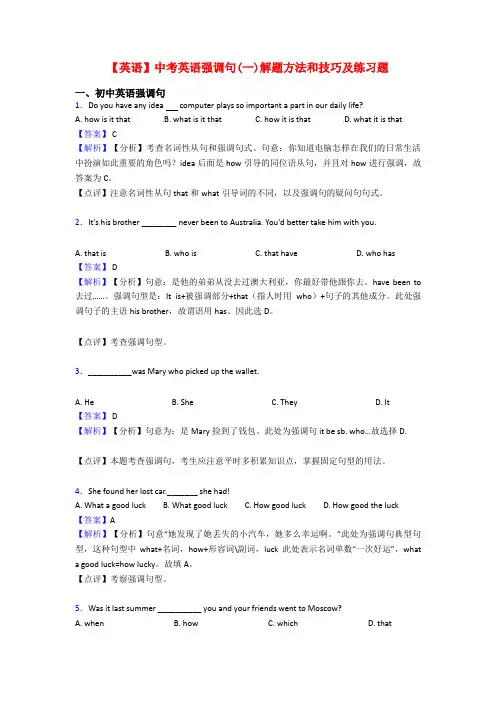
【英语】中考英语强调句(一)解题方法和技巧及练习题一、初中英语强调句1.Do you have any idea computer plays so important a part in our daily life?A. how is it thatB. what is it thatC. how it is thatD. what it is that【答案】 C【解析】【分析】考查名词性从句和强调句式。
句意:你知道电脑怎样在我们的日常生活中扮演如此重要的角色吗?idea后面是how引导的同位语从句,并且对how进行强调,故答案为C。
【点评】注意名词性从句that和what引导词的不同,以及强调句的疑问句句式。
2.It's his brother ________ never been to Australia. You'd better take him with you.A. that isB. who isC. that haveD. who has【答案】 D【解析】【分析】句意:是他的弟弟从没去过澳大利亚,你最好带他跟你去。
have been to 去过……。
强调句型是:It is+被强调部分+that(指人时用who)+句子的其他成分。
此处强调句子的主语his brother,故谓语用has。
因此选D。
【点评】考查强调句型。
3.__________was Mary who picked up the wallet.A. HeB. SheC. TheyD. It【答案】 D【解析】【分析】句意为:是Mary捡到了钱包。
此处为强调句it be sb. who…故选择D.【点评】本题考查强调句,考生应注意平时多积累知识点,掌握固定句型的用法。
4.She found her lost car._______ she had!A. What a good luckB. What good luckC. How good luckD. How good the luck【答案】A【解析】【分析】句意“她发现了她丢失的小汽车,她多么幸运啊。
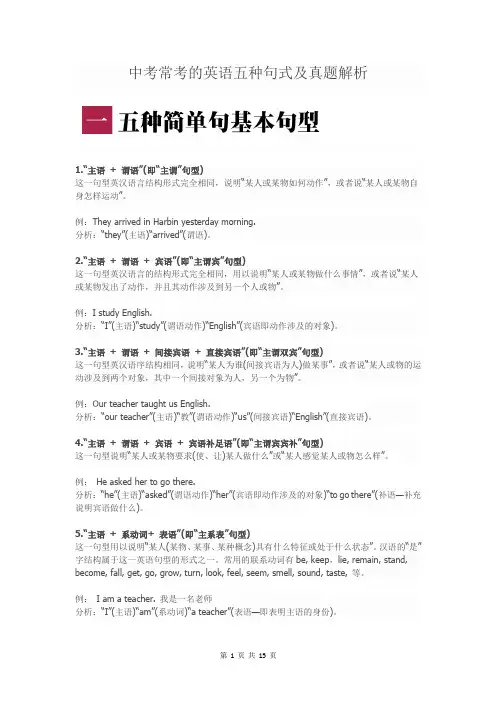
中考常考的英语五种句式及真题解析1.“主语+ 谓语”(即“主谓”句型)这一句型英汉语言结构形式完全相同,说明“某人或某物如何动作”,或者说“某人或某物自身怎样运动”。
例:They arrived in Harbin yesterday morning.分析:“they”(主语)“arrived”(谓语)。
2.“主语+ 谓语+ 宾语”(即“主谓宾”句型)这一句型英汉语言的结构形式完全相同,用以说明“某人或某物做什么事情”,或者说“某人或某物发出了动作,并且其动作涉及到另一个人或物”。
例:I study English.分析:“I”(主语)“study”(谓语动作)“English”(宾语即动作涉及的对象)。
3.“主语+ 谓语+ 间接宾语+ 直接宾语”(即“主谓双宾”句型)这一句型英汉语序结构相同,说明“某人为谁(间接宾语为人)做某事”,或者说“某人或物的运动涉及到两个对象,其中一个间接对象为人,另一个为物”。
例:Our teacher taught us English.分析:“our teacher”(主语)“教”(谓语动作)“us”(间接宾语)“English”(直接宾语)。
4.“主语+ 谓语+ 宾语+ 宾语补足语”(即“主谓宾宾补”句型)这一句型说明“某人或某物要求(使、让)某人做什么”或“某人感觉某人或物怎么样”。
例:He asked her to go there.分析:“he”(主语)“asked”(谓语动作)“her”(宾语即动作涉及的对象)“to go there”(补语—补充说明宾语做什么)。
5.“主语+ 系动词+ 表语”(即“主系表”句型)这一句型用以说明“某人(某物、某事、某种概念)具有什么特征或处于什么状态”。
汉语的“是”字结构属于这一英语句型的形式之一。
常用的联系动词有be, keep,lie, remain, stand, become, fall, get, go, grow, turn, look, feel, seem, smell, sound, taste, 等。
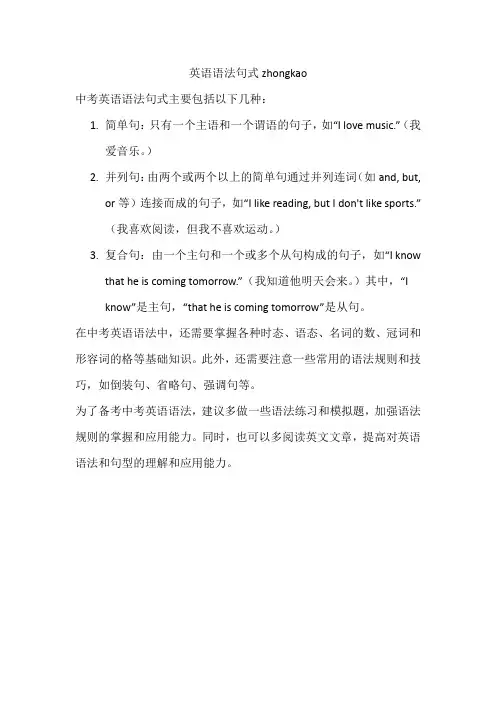
英语语法句式zhongkao
中考英语语法句式主要包括以下几种:
1.简单句:只有一个主语和一个谓语的句子,如“I love music.”(我
爱音乐。
)
2.并列句:由两个或两个以上的简单句通过并列连词(如and, but,
or等)连接而成的句子,如“I like reading, but I don't like sports.”
(我喜欢阅读,但我不喜欢运动。
)
3.复合句:由一个主句和一个或多个从句构成的句子,如“I know
that he is coming tomorrow.”(我知道他明天会来。
)其中,“I
know”是主句,“that he is coming tomorrow”是从句。
在中考英语语法中,还需要掌握各种时态、语态、名词的数、冠词和形容词的格等基础知识。
此外,还需要注意一些常用的语法规则和技巧,如倒装句、省略句、强调句等。
为了备考中考英语语法,建议多做一些语法练习和模拟题,加强语法规则的掌握和应用能力。
同时,也可以多阅读英文文章,提高对英语语法和句型的理解和应用能力。
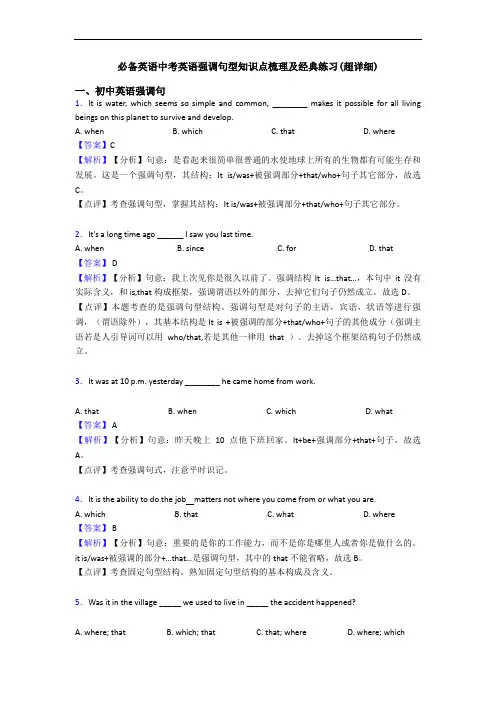
必备英语中考英语强调句型知识点梳理及经典练习(超详细)一、初中英语强调句1.It is water, which seems so simple and common, ________ makes it possible for all living beings on this planet to survive and develop.A. whenB. whichC. thatD. where【答案】C【解析】【分析】句意:是看起来很简单很普通的水使地球上所有的生物都有可能生存和发展。
这是一个强调句型,其结构:It is/was+被强调部分+that/who+句子其它部分,故选C。
【点评】考查强调句型,掌握其结构:It is/was+被强调部分+that/who+句子其它部分。
2.It's a long time ago ______ I saw you last time.A. whenB. sinceC. forD. that【答案】 D【解析】【分析】句意:我上次见你是很久以前了。
强调结构It is…that…,本句中it没有实际含义,和is,that构成框架,强调谓语以外的部分,去掉它们句子仍然成立。
故选D。
【点评】本题考查的是强调句型结构。
强调句型是对句子的主语,宾语,状语等进行强调,(谓语除外),其基本结构是It is +被强调的部分+that/who+句子的其他成分(强调主语若是人引导词可以用who/that,若是其他一律用that )。
去掉这个框架结构句子仍然成立。
3.It was at 10 p.m. yesterday ________ he came home from work.A. thatB. whenC. whichD. what【答案】 A【解析】【分析】句意:昨天晚上10点他下班回家。
It+be+强调部分+that+句子,故选A。
【点评】考查强调句式,注意平时识记。
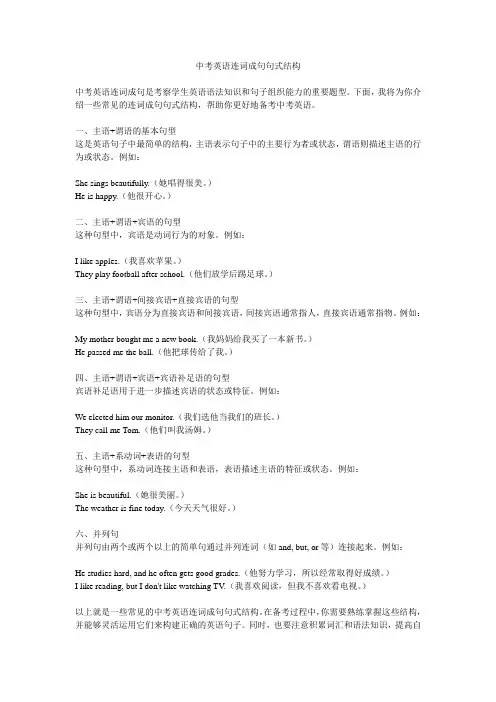
中考英语连词成句句式结构中考英语连词成句是考察学生英语语法知识和句子组织能力的重要题型。
下面,我将为你介绍一些常见的连词成句句式结构,帮助你更好地备考中考英语。
一、主语+谓语的基本句型这是英语句子中最简单的结构,主语表示句子中的主要行为者或状态,谓语则描述主语的行为或状态。
例如:She sings beautifully.(她唱得很美。
)He is happy.(他很开心。
)二、主语+谓语+宾语的句型这种句型中,宾语是动词行为的对象。
例如:I like apples.(我喜欢苹果。
)They play football after school.(他们放学后踢足球。
)三、主语+谓语+间接宾语+直接宾语的句型这种句型中,宾语分为直接宾语和间接宾语,间接宾语通常指人,直接宾语通常指物。
例如:My mother bought me a new book.(我妈妈给我买了一本新书。
)He passed me the ball.(他把球传给了我。
)四、主语+谓语+宾语+宾语补足语的句型宾语补足语用于进一步描述宾语的状态或特征。
例如:We elected him our monitor.(我们选他当我们的班长。
)They call me Tom.(他们叫我汤姆。
)五、主语+系动词+表语的句型这种句型中,系动词连接主语和表语,表语描述主语的特征或状态。
例如:She is beautiful.(她很美丽。
)The weather is fine today.(今天天气很好。
)六、并列句并列句由两个或两个以上的简单句通过并列连词(如and, but, or等)连接起来。
例如:He studies hard, and he often gets good grades.(他努力学习,所以经常取得好成绩。
)I like reading, but I don't like watching TV.(我喜欢阅读,但我不喜欢看电视。
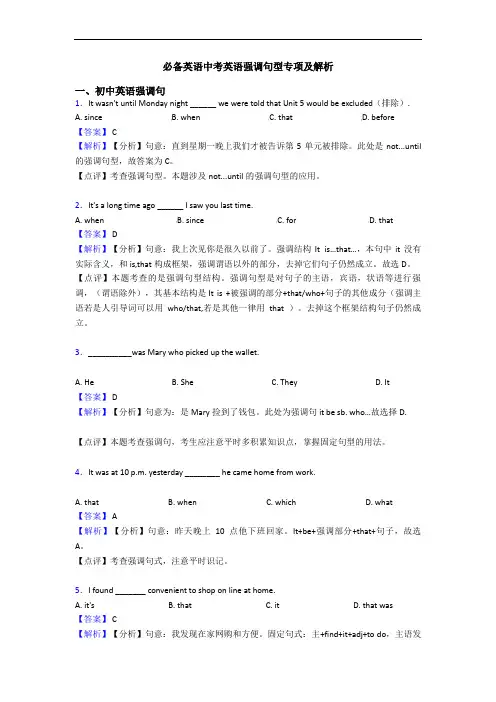
必备英语中考英语强调句型专项及解析一、初中英语强调句1.It wasn't until Monday night ______ we were told that Unit 5 would be excluded(排除).A. sinceB. whenC. thatD. before【答案】 C【解析】【分析】句意:直到星期一晚上我们才被告诉第5单元被排除。
此处是not...until的强调句型,故答案为C。
【点评】考查强调句型。
本题涉及not...until的强调句型的应用。
2.It's a long time ago ______ I saw you last time.A. whenB. sinceC. forD. that【答案】 D【解析】【分析】句意:我上次见你是很久以前了。
强调结构It is…that…,本句中it没有实际含义,和is,that构成框架,强调谓语以外的部分,去掉它们句子仍然成立。
故选D。
【点评】本题考查的是强调句型结构。
强调句型是对句子的主语,宾语,状语等进行强调,(谓语除外),其基本结构是It is +被强调的部分+that/who+句子的其他成分(强调主语若是人引导词可以用who/that,若是其他一律用that )。
去掉这个框架结构句子仍然成立。
3.__________was Mary who picked up the wallet.A. HeB. SheC. TheyD. It【答案】 D【解析】【分析】句意为:是Mary捡到了钱包。
此处为强调句it be sb. who…故选择D.【点评】本题考查强调句,考生应注意平时多积累知识点,掌握固定句型的用法。
4.It was at 10 p.m. yesterday ________ he came home from work.A. thatB. whenC. whichD. what【答案】 A【解析】【分析】句意:昨天晚上10点他下班回家。
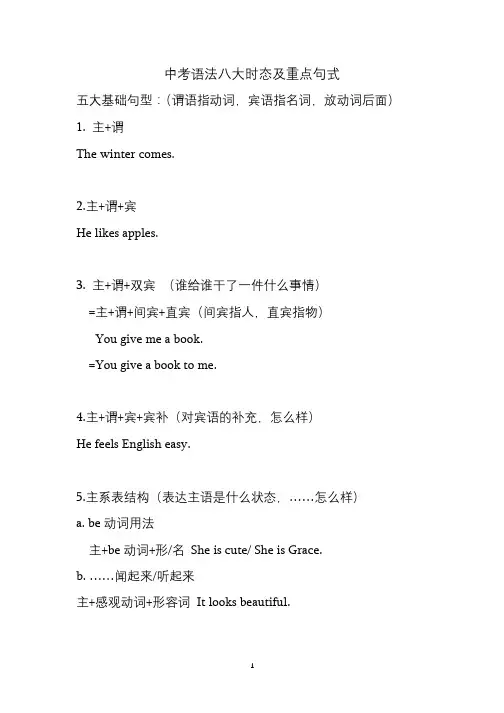
中考语法八大时态及重点句式五大基础句型:(谓语指动词,宾语指名词,放动词后面)1. 主+谓The winter comes.2.主+谓+宾He likes apples.3. 主+谓+双宾(谁给谁干了一件什么事情)=主+谓+间宾+直宾(间宾指人,直宾指物)You give me a book.=You give a book to me.4.主+谓+宾+宾补(对宾语的补充,怎么样)He feels English easy.5.主系表结构(表达主语是什么状态,……怎么样)a. be动词用法主+be动词+形/名She is cute/ She is Grace.b. ……闻起来/听起来主+感观动词+形容词It looks beautiful.句子的八种基本时态其实语法用上面的表格就可以很明白它的搭配了,下面例句用数字对应到表格里,用一个洗车系列的例句来看就更加清楚了哈一. 一般时(一般时) 1.He washes his car every day.二. 进行时过去:(一般时) 2.He washed his car yesterday.(进行时) 3.He was washing his car when I suddenly saw him.现在:(一般时)1. He washes his car four times a week.(进行时) 4. Look!He is washing his car now.将来:(一般时)5. He will wash his car tomorrow.三.完成时过去:(完成时)6.He had washed his car before I got to his house.现在:(完成时)7.He has already washed his car.四.过去将来时过去时间的将来(过去将来时)8. Yesterday he said he would wash the car, buthe didn’t.总结下时态的标志词:1.一般现在时:always,often,usually,sometimes,every day2.一般过去时:yesterday,last week,in 1998,two days ago3.现在进行时:now, right now, at the moment, these days, look!4.过去进行时:at seven yesterday morning, from 9 to 10 last night, at this time last Monday, when someone knocked at the door5.一般将来时:tomorrow,next week,next year,in the future6.过去将来时:从过去某一时间看来将要发生的动作或存在的状态。
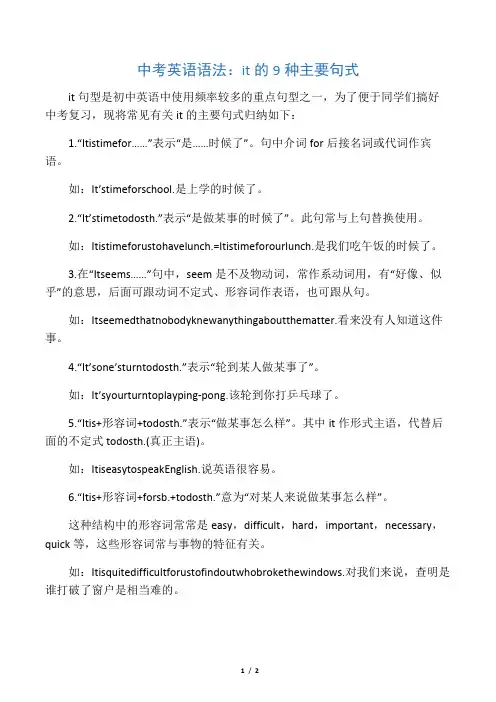
中考英语语法:it的9种主要句式it句型是初中英语中使用频率较多的重点句型之一,为了便于同学们搞好中考复习,现将常见有关it的主要句式归纳如下:1.“Itistimefor……”表示“是……时候了”。
句中介词for后接名词或代词作宾语。
如:It’stimeforschool.是上学的时候了。
2.“It’stimetodosth.”表示“是做某事的时候了”。
此句常与上句替换使用。
如:Itistimeforustohavelunch.=Itistimeforourlunch.是我们吃午饭的时候了。
3.在“Itseems……”句中,seem是不及物动词,常作系动词用,有“好像、似乎”的意思,后面可跟动词不定式、形容词作表语,也可跟从句。
如:Itseemedthatnobodyknewanythingaboutthematter.看来没有人知道这件事。
4.“It’sone’sturntodosth.”表示“轮到某人做某事了”。
如:It’syourturntoplayping-pong.该轮到你打乒乓球了。
5.“Itis+形容词+todosth.”表示“做某事怎么样”。
其中it作形式主语,代替后面的不定式todosth.(真正主语)。
如:ItiseasytospeakEnglish.说英语很容易。
6.“Itis+形容词+forsb.+todosth.”意为“对某人来说做某事怎么样”。
这种结构中的形容词常常是easy,difficult,hard,important,necessary,quick等,这些形容词常与事物的特征有关。
如:Itisquitedifficultforustofindoutwhobrokethewindows.对我们来说,查明是谁打破了窗户是相当难的。
7.“Itis+形容词+ofsb.+todosth.”表示“某人做某事怎样”。
这种结构中的形容词常常是:good,kind,nice,wrong,clever等,这些形容词常与人的性格特点有关。
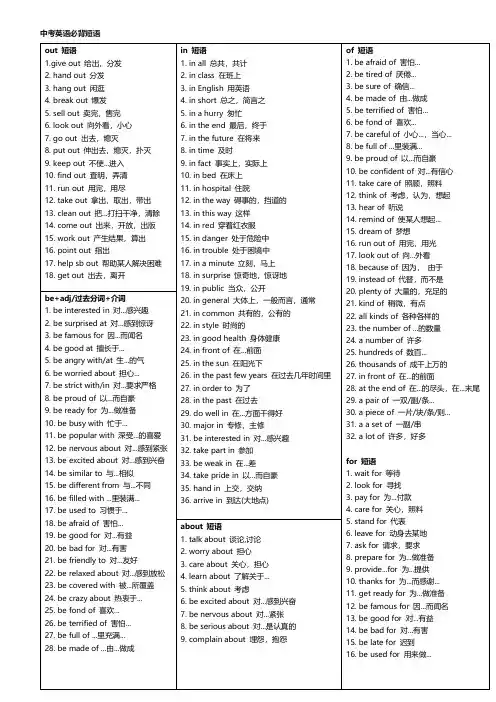
中考英语必背短语out 短语1.give out 给出,分发2. hand out 分发3. hang out 闲逛4. break out 爆发5. sell out 卖完,售完6. look out 向外看,小心7. go out 出去,熄灭8. put out 伸出去,熄灭,扑灭9. keep out 不使...进入10. find out 查明,弄清11. run out 用完,用尽12. take out 拿出,取出,带出13. clean out 把...打扫干净,清除14. come out 出来,开放,出版15. work out 产生结果,算出16. point out 指出17. help sb out 帮助某人解决困难18. get out 出去,离开in 短语1. in all 总共,共计2. in class 在班上3. in English 用英语4. in short 总之,简言之5. in a hurry 匆忙6. in the end 最后,终于7. in the future 在将来8. in time 及时9. in fact 事实上,实际上10. in bed 在床上11. in hospital 住院12. in the way 碍事的,挡道的13. in this way 这样14. in red 穿着红衣服15. in danger 处于危险中16. in trouble 处于困境中17. in a minute 立刻,马上18. in surprise 惊奇地,惊讶地19. in public 当众,公开20. in general 大体上,一般而言,通常21. in common 共有的,公有的22. in style 时尚的23. in good health 身体健康24. in front of 在...前面25. in the sun 在阳光下26. in the past few years 在过去几年时间里27. in order to 为了28. in the past 在过去29. do well in 在...方面干得好30. major in 专修,主修31. be interested in 对...感兴趣32. take part in 参加33. be weak in 在...差34. take pride in 以...而自豪35. hand in 上交,交纳36. arrive in 到达(大地点)of 短语1. be afraid of 害怕...2. be tired of 厌倦...3. be sure of 确信...4. be made of 由...做成5. be terrified of 害怕...6. be fond of 喜欢...7. be careful of 小心...,当心...8. be full of ...里装满...9. be proud of 以...而自豪10. be confident of 对...有信心11. take care of 照顾,照料12. think of 考虑,认为,想起13. hear of 听说14. remind of 使某人想起...15. dream of 梦想16. run out of 用完,用光17. look out of 向...外看18. because of 因为,由于19. instead of 代替,而不是20. plenty of 大量的,充足的21. kind of 稍微,有点22. all kinds of 各种各样的23. the number of ...的数量24. a number of 许多25. hundreds of 数百...26. thousands of 成千上万的27. in front of 在...的前面28. at the end of 在...的尽头,在...末尾29. a pair of 一双/副/条...30. a piece of 一片/块/条/则...31. a a set of 一副/串32. a lot of 许多,好多for 短语1. wait for 等待2. look for 寻找3. pay for 为...付款4. care for 关心,照料5. stand for 代表6. leave for 动身去某地7. ask for 请求,要求8. prepare for 为...做准备9. provide...for 为...提供10. thanks for 为...而感谢...11. get ready for 为...做准备12. be famous for 因...而闻名13. be good for 对...有益14. be bad for 对...有害15. be late for 迟到be+adj/过去分词+介词1. be interested in 对...感兴趣2. be surprised at 对...感到惊讶3. be famous for 因...而闻名4. be good at 擅长于...5. be angry with/at 生...的气6. be worried about 担心...7. be strict with/in 对...要求严格8. be proud of 以...而自豪9. be ready for 为...做准备10. be busy with 忙于...11. be popular with 深受...的喜爱12. be nervous about 对...感到紧张13. be excited about 对...感到兴奋14. be similar to 与...相似15. be different from 与...不同16. be filled with ...里装满...17. be used to 习惯于...18. be afraid of 害怕...19. be good for 对...有益20. be bad for 对...有害21. be friendly to 对...友好22. be relaxed about 对...感到放松23. be covered with 被...所覆盖24. be crazy about 热衷于...25. be fond of 喜欢...26. be terrified of 害怕...27. be full of ...里充满...28. be made of ...由...做成about 短语1. talk about 谈论,讨论2. worry about 担心3. care about 关心,担心4. learn about 了解关于...5. think about 考虑6. be excited about 对...感到兴奋7. be nervous about 对...紧张8. be serious about 对...是认真的9. complain about 埋怨,抱怨up 短语1. give up 放弃2. take up 占据,占去,从事3. put up 举起,挂起,张贴,搭建4. set up 建立,创立5. open up 打开,开阔6. dress up 乔装打扮7. stay up 熬夜,不睡觉8. wake up 醒来,唤醒,叫醒9. look up 向上看,查阅10. cheer up 使...振作11. end up 以...结束,结果为...12. go up 升起,上升13. hurry up 赶快14. use up 用光,用完15. show up 出席,露面16. stand up 起立,站起来17. make up 编造,构成,化妆18. think up 想出,提出19. cut up 切碎20. pick up 捡起,乘搭便车21. mix up 混合22. call up 打电话23. grow up 成长,长大24. ring up 打电话25. clean up 把...打扫干净26. fix up 修理,修补27. get up 起床28. keep up 保持,坚持29. fill up 装满30. send up 发射on 短语1. on duty 值日,值班2. on time 准时,按时3. on foot 步行4. on vacation 度假5. on sale 销售,出售6. on TV 在电视里7. on display 展出,陈列8. on board 在船上9. on the Internet 在网上10. on the radio 在收音机里11. on one’s way 在—的路上12. on weekends 在周末13. on the other hand 另一方面14. on the left/right 在左边/右边15. on the phone 用电话交谈,在通话16. on the wall 在墙上17. depend on 依靠,依赖,取决于18. get on 上车,相处,进展19. work on 从事,忙于,演算20. put on 穿上,戴上21. turn on 打开22. try on 试穿,试戴23. pass on 传递24. hold on 稍等片刻25. go on 继续26. decide on 决定27. concentrate on 专心,专注28. live on 以...为生29. spend...on 在...花费30. come on 加油,来吧at 短语1. at once 立刻,马上2. at least 至少3. at most 最多4. at last 最后5. at home 在家6. at noon 在中午7. at night 在夜晚8. at times 有时,偶尔9. at school 在上学10. at table 在吃饭11. at present 目前,现在12. at work 在工作13. at all 全然,根本14. at the age of 在...岁时15. at the end of 在...结尾16. at the moment 此刻,现在17. at the same time 同时18. at first 首先19. aim at 旨在,目的是20. knock at 敲击21. look at 看着22. shout at 叫喊,叫嚷23. point at 指着24. arrive at 到达25. be good at 对...干得好26. be angry at 对...生气27. be surprised at对...感到惊讶28. laugh at 嘲笑29. arrive at (小地点)look 短语1. look at 看......2. look for 寻找3. look up 查阅,向上看4. look out 向外看,小心5. look over 仔细检查6. look after 照顾,照料7. look like 看起来像8. look through 浏览9. look into 向—里看10. look around 环顾四周11. look forward to 期盼,期待12. look ahead 向前看get 短语1. get up 起床2. get off 下车3. get on 上车,相处,进展4. get over 克服,恢复,原谅5. get back 回来,返回6. get through 接通电话7. get along 进展,相处8. get into 陷入...9. get out 出去,离开10. get together 相聚11. get ready for 为...做准备12. get married 结婚13. get in the way 碍事,挡道14. get to 到达come 短语1. come over 顺便来访2. come true 实现,达到3. come out 出来,开放,出版4. come on 加油,来吧5. come back 回来6. come up with 想出,提出7. come in 进来8. come along 出现,发生,来到9. come from 来自,产自10. come across 遇见,(偶然)发现1.near the fireplace 在火炉旁2.sit down 坐下3.jump up 跳起来4.be angry with sb. 跟某人生气5.get into the room through the window 从窗户进入房间6.have lessons 上课7.have to 必须,不得不8.be wet through 全部湿透9.on one’s back 在某人的背上10.read through the newspaper 通读报纸51.invite sb. to a big dinner 邀请某人就餐52.near the end of the match 比赛快要结束53.catch the ball 接住球54.pass the hospital 路过医院55.pass sb.sth.把某物递给某人56.pass the maths exam 数学考试及格57.a famous play 著名戏剧58.put on a short play 上映短剧59.get longer and longer 天变得越来越长60.get dark 天黑11.be cold and hungry 又冷又饿12.next morning 第二天早晨13.make sth. for sb. 为某人做…14.buy sth. for sb. 为某人买东西15.help sb.with sth. 在某方面帮助某人help sb.(to) do sth.帮助某人做某事16.run out of the house 跑出房间17.keep sth. 保留东西18.keep oneself clean 保持个人卫生20.hand sth.to sb. 把某物递给某人.hand in sth.to sb.上交某人某物61.get some letters from my friends 收到朋友的来信62.get the news 得到消息63.get to the station 到达车站64.get home 到家get there 到达哪儿65.have got 有66.get on well with sb.和某人相处的很好67.the right answers 正确答案68.both her parents 她的父母双方69.both of them 他们中两个人70.on both sides of the street 在马路两旁19.a bit cheapcr 便宜一点儿21.put up one’s hand 举手22.put on 穿上take off 脱下23.jump up 跳起24.be ready to do sth 淮备做某事25.all kinds of 各种各样26.show sb. sth. 向某人展示某事27.begin to do sth.开始做某事28.make…from 用……制作29.be back soon 一会儿就回来30.in one’s hand 在手里71.in both hands 在双手里用双手72.move over to the table 到桌前就餐73.prepare so much delicious food 准备很多丰盛食物74.help oneself to sth. 自便,随便吃75.a team from a country school 一支来自农村的球队(运动员)76.look like看起来像77.one of the boys 男孩中一个78.a boy in a dirty T-shirt 一个穿着脏T恤衫的男孩79.stop the passs 阻止传球80.turn to shoot 转过来投球31. again and again 一次又一次32.wait a moment 等一会33.have no money 没钱34.come back without the coat 没有穿衣服回来35.understand his kind father 理解他好心的父亲36.be afraid 害怕37.a map of Beijing (China , the world) 一张北京地图38.at the end of this class 这节课结束39.Sorry to trouble you. 对不起给你找麻烦了。
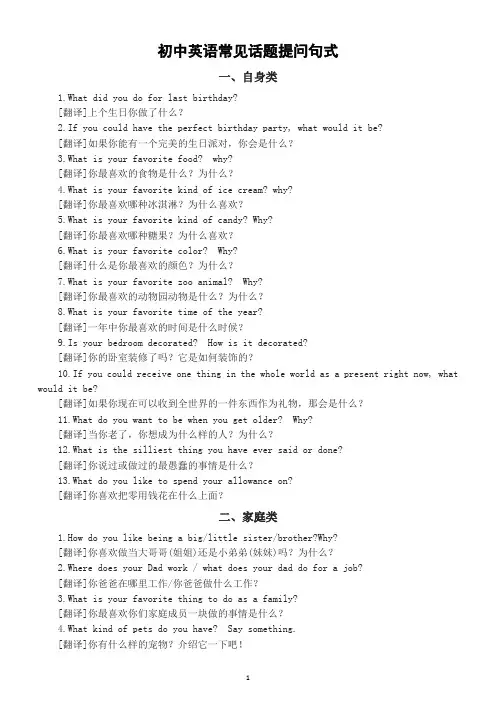
初中英语常见话题提问句式一、自身类1.What did you do for last birthday?[翻译]上个生日你做了什么?2.If you could have the perfect birthday party, what would it be?[翻译]如果你能有一个完美的生日派对,你会是什么?3.What is your favorite food? why?[翻译]你最喜欢的食物是什么?为什么?4.What is your favorite kind of ice cream? why?[翻译]你最喜欢哪种冰淇淋?为什么喜欢?5.What is your favorite kind of candy? Why?[翻译]你最喜欢哪种糖果?为什么喜欢?6.What is your favorite color? Why?[翻译]什么是你最喜欢的颜色?为什么?7.What is your favorite zoo animal? Why?[翻译]你最喜欢的动物园动物是什么?为什么?8.What is your favorite time of the year?[翻译]一年中你最喜欢的时间是什么时候?9.Is your bedroom decorated? How is it decorated?[翻译]你的卧室装修了吗?它是如何装饰的?10.If you could receive one thing in the whole world as a present right now, what would it be?[翻译]如果你现在可以收到全世界的一件东西作为礼物,那会是什么?11.What do you want to be when you get older? Why?[翻译]当你老了,你想成为什么样的人?为什么?12.What is the silliest thing you have ever said or done?[翻译]你说过或做过的最愚蠢的事情是什么?13.What do you like to spend your allowance on?[翻译]你喜欢把零用钱花在什么上面?二、家庭类1.How do you like being a big/little sister/brother?Why?[翻译]你喜欢做当大哥哥(姐姐)还是小弟弟(妹妹)吗?为什么?2.Where does your Dad work / what does your dad do for a job?[翻译]你爸爸在哪里工作/你爸爸做什么工作?3.What is your favorite thing to do as a family?[翻译]你最喜欢你们家庭成员一块做的事情是什么?4.What kind of pets do you have? Say something.[翻译]你有什么样的宠物?介绍它一下吧!三、学校类1.Which teacher is your favorite one? Why?[翻译]你比较喜欢哪个老师?为什么?2.Do you go to school on foot or by bus? What do you feel?[翻译]你坐公共汽车去学校还是步行去学校?你感觉如何?3.What is your favorite thing to study at school?[翻译]你最喜欢在学校学习什么?4.What are you studying in school right now in math? …foreign language? ...science? etc?[翻译]你现在在学校学什么?数学?…外语? ..科学?......5.What is your least favorite thing to study? Why?[翻译]你最不喜欢学习什么?为什么?6.Who is your best friend? Why?[翻译]谁是你最好的朋友?为什么?7.What do you like to play at recess?[翻译]课间休息时你喜欢玩什么?四、休闲类1.What do you like to do for fun? Why?[翻译]你喜欢什么娱乐活动?为什么?2.Do you play sports? Which ones?[翻译]你运动吗?哪个?3.What is your favorite thing to do on the weekend?[翻译]周末你最喜欢做什么?4.Do you prefer to spend your time inside or outside?[翻译]你更喜欢在室内还是室外消磨时间?5.Do you like to draw? What kinds of things do you draw?[翻译]你喜欢画画吗?你画什么样的东西?6.What do you do when you get home from school? why?[翻译]放学回家后你会做什么?为什么?7.Where is the most exciting place you have been in the past year? Say something.[翻译]过去一年你去过的最激动人心的地方在哪里?说一说。
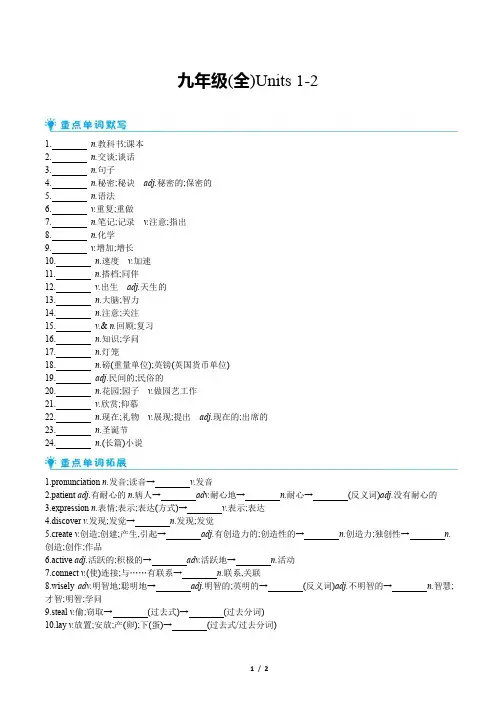
九年级(全)Units1-21.n.教科书;课本2.n.交谈;谈话3.n.句子4.n.秘密;秘诀adj.秘密的;保密的5.n.语法6.v.重复;重做7.n.笔记;记录v.注意;指出8.n.化学9.v.增加;增长10.n.速度v.加速11.n.搭档;同伴12.v.出生adj.天生的13.n.大脑;智力14.n.注意;关注15.v.& n.回顾;复习16.n.知识;学问17.n.灯笼18.n.磅(重量单位);英镑(英国货币单位)19.adj.民间的;民俗的20.n.花园;园子v.做园艺工作21.v.欣赏;仰慕22.n.现在;礼物v.展现;提出adj.现在的;出席的23.n.圣诞节24.n.(长篇)小说1.pronunciation n.发音;读音→v.发音2.patient adj.有耐心的n.病人→adv.耐心地→n.耐心→(反义词)adj.没有耐心的3.expression n.表情;表示;表达(方式)→v.表示;表达4.discover v.发现;发觉→n.发现;发觉5.create v.创造;创建;产生,引起→adj.有创造力的;创造性的→n.创造力;独创性→n.创造;创作;作品6.active adj.活跃的;积极的→adv.活跃地→n.活动7.connect v.(使)连接;与……有联系→n.联系,关联8.wisely adv.明智地;聪明地→adj.明智的;英明的→(反义词)adj.不明智的→n.智慧;才智;明智;学问9.steal v.偷;窃取→(过去式)→(过去分词)y v.放置;安放;产(卵);下(蛋)→(过去式/过去分词)11.tie n.领带v.捆;束→(现在分词)12.treat n.款待;招待v.招待;请(客)→n.对待;待遇;治疗13.business n.生意;商业→n.商人14.punish v.处罚;惩罚→n.惩罚15.warn v.警告;告诫→n.警告16.spread v.传播;展开n.蔓延;传播→(过去式/过去分词)1.word by word逐字地2.be afraid to do sth.害怕做某事3.fall in love with sb./sth.爱上某人/某物4.look up (在词典、参考书中或通过电脑)查阅;抬头看5.be born with天生具有6.pay attention to注意;关注7.connect...with...把……和……连接或联系起来8.on one’s own独自地9.bit by bit渐渐地,逐渐地10.put on增加(体重);发胖11.throw...at...向……扔……12.wash away洗掉;冲走13.fly up to...飞往……14.call out呼喊y out摆开;布置16.as a result结果17.end up最终成为;最后处于18.in need在贫困中;在困难时19.spread around四处传播20.give birth to life孕育生命The Mid⁃Autumn Festival is a traditional Chinese festival.Its traditional food—mooncakes,in the 1.(形状) of a full moon,carry people’s best wishes to their families.Among the 2.(民间的) stories about the festival,the most touching one is about a couple called Hou Yi and Chang’e.A goddess gave Hou Yi magic medicine which could make people live forever to thank him for shooting down the nine suns.However,Pang Meng tried to 3.(偷) the medicine when Chang’e was home alone.Chang’e 4.(拒绝) to give it to him and took it all.As a result,she flew up to the moon.Hou Yi was so sad that he called out her name to the moon every night.When he saw Chang’e on a night with such a round and 5.b (明亮的) moon,he quickly laid out her favorite food in the 6.(花园).He wished Chang’e could come back!Since then,the tradition of admiring the moon and sharing mooncakes with families started.[九(全)Unit2 Section A3a]。
中考英语万能亮点句型一. There is no句型1. There is no doing 结构。
其意为“不可能…”、“无法…”:There’s no denying the fact. 这一事实不容否认。
There is no getting over the difficulty. 这困难无法克服。
There is no knowing what he will do next. 无法知道他下一步要干什么。
There was no telling when she would be back。
没法知道她什么时候回来。
2. There is no difficulty in doing sth结构。
意为“做某事没有困难”:There is no difficulty in finding his office. 找到了他的办公室没费一点劲。
There was no difficulty in carrying out the plan. 执行这项计划没什么困难。
3. There’s no doubt of sth. / dong sth / that … 结构。
意为“毫无疑问…”:There is no doubt of his success. 毫无疑问他一定会成功。
There could be no doubt that he was one of the best writer in this country. 毫无疑问他是这个国家最优秀的作家之一。
4. There is no hurry (to do sth) 句式。
其意为“不用急(于做某事)”:There’s no hurry to return the book. 现在不急于还书。
There’s no hurry, so do it slowly and carefully. 不用赶时间,要慢慢细心地做。
5.There’s no need ( for sb. ) to do sth. …结构。
2022中考英语语法复习——句子讲解与练习(1)及解析考点一:陈述句和疑问句【中考链接】1.(2011济南)Alice does the shopping on Sundays. (改为否定句)Alice the shopping on Sundays.2.(2011济南)He spent a whole morning cleaning the room. (就划线部分提问)he cleaning the room?3.(2011四川乐山)We will turn off the lights for an hour on Earth Day.(对划线部分提问) ________ ________ we turn off the lights for an hour?4.(2011四川乐山)Shall we have a picnic at the weekend? (改为同义句)________ ________ having a picnic at the weekend?5.(2011山东菏泽)—Could I use your bike for today, Sam?—_____. I’m not using it.A. Sure, go aheadB. I have no ideaC. No, you can’tD. Never mind1. doesn't do2. How long did, spend3.When will4. What/ How about 83. asked; to5.A【考点点拨】1. 确信句的差不多结构是“主语+谓语”;否定句分完全否定和部分否定。
完全否定常用not, no, no one, nobody, nothing, neither, none, never 等词表示否定意义;部分否定用hardly, seldom, few, little等词表示或not 和both, all, each, quite, always 等连用表示部分否定。
【2021·广西梧州市·中考真题】—_____ your hands before dinner, Tony.—No problem, Mom.A.Wash B.Washes C.Washing D.To wash【参考答案】A【试题解析】句意:—饭前洗手,托尼。
—没问题,妈妈。
考查祈使句。
分析句子结构可知,此处应该是祈使句结构,句子应以动词原形开头,故选A。
此题考查祈使句,祈使句的句首要用动词原形。
因为后面有名词Tony,所以学生易误选B,但是要明确一点,该句话是对Tony说的这个具体的语境。
祈使句的基本用法祈使句是用来表示命令、请求、建议或劝告等的句子。
常省略主语,谓语动词用原形。
1. 肯定的祈使句①句型:动词原形+其他成分。
Be careful! 小心!②"Do+祈使句"表示一种强烈的感情或请求,do起强调作用。
③please用在祈使句中可以表示一种客气的语气,但please用在句末时,必须用逗号与其余部分隔开。
Close the door, please. 请关门。
2. 否定的祈使句①常用句型:Don’t+动词原形+其他成分。
Don’t be late for school again! 别再迟到了!②用Never开头:Never+动词原形+其他成分。
Never leave today’s work for tomorrow! 不要把今天的工作留到明天!3. Let引导的祈使句以Let开头的句子也是祈使句,表示陈述和建议。
其否定形式有两种:Let...not或Don’t...Let us not be late. 让我们不要迟到。
Don’t let the boy play football in the street. 不要让这个男孩在街上踢足球。
【典例】1. —Mark, please don’t play basketball on the road. It’s very dangerous.—____________. I am going home at once.A. Have a great timeB. Sorry, I won’t do thatC. I’d like toD. OK, with pleasure【答案】B【解析】对今后不要做某事的命令或请求表示接受时,回答要用否定的将来时。
九年级英语重点句型、句式Unit 11.by + doing通过……方式如:by studying with a groupby还可以表示:“在…旁”、“靠近”、“在…期间”、“用”、“经过”、“乘车”等如:I live by the river.I have to go back by ten o’clock.The thief entered the room by the window.The student went to park by bus.2.too…to太…而不能常用的句型too+adj./adv. + to do sth.如:I’m too tired to say anything.我太累了,什么都不想说。
3.be / get excited about sth.===be / get excited about doing sth.=be excited to do sth.对…感兴奋如:I am / get excited about going to Beijing.=I am excited to go to Beijing.我对去北京感到兴奋。
4.①end up doing sth终止做某事,结束做某事如:he party ended up singing.晚会以唱歌而结束。
②end up with sth.以…结束如:The party ended up with her singing.晚会以她的歌唱而告终。
5.one of +(the+形容词比较级)+名词复数形式…其中之一如:She is one of the most popular teachers.她是最受欢迎的教师之一。
6.It’s +形容词+(for sb. ) to do sth. (对于某人来说)做某事…如:It’s difficult (for me ) to study English.对于我来说学习英语太难了。
【英语】中考英语专题汇编英语状语从句(一)及解析一、初中英语状语从句1.He has made great progress his mother is very pleased with him.A.so;that B.enough;to C.so;too D.such;that【答案】D【解析】【详解】句意:他已经取得了如此大的进步以至于他的妈妈对他非常满意。
从句意可知这里需要用到“如此….以至于”so+形容词/副词+that或such+名词+that,根据句子中的great progress意思是很大的进步,是名词短语,故用such…that, 故选D。
2.---The two old friends were ____ busy ____ with each other that they forgot the time.---Yes. They hadn’t met for over ten years, so they kept talking the whole night.A.too; to talk B.too; talking C.so; to talk D.so; talking;【答案】D【解析】试题分析:句意:这两个老朋友那么忙于交谈以至于忘了时间。
是。
他们十年多没见到了,所以他们聊了一晚上。
考查句式so…that…因此……以至于……;be busy doing忙于做……,故选D。
考点:考查so…that句式。
3.--- Do you know what time Daniel Xuzhou tomorrow?---At 2:00 p. m. I will meet him when he at the airport.A.gets to; arrives B.will get to; will arriveC.will get to; arrives D.gets to; will arrive【答案】C【解析】句意:——你知道丹尼尔明天什么时候去徐州吗?——下午2:00点。
中考英语50个典型句式1. as soon as一…就…2. (not)as/so…as不如3.as…aspossible尽可能地4.asksbforsth..请求,要求5. ask/tell sb. (how) to do sth.请教/告诉某人如何做…6. ask/tell sb. (not) to do sth.请/告诉某人做/不做某事7.be afraid of doing sth. / that…害怕做某事/害怕,担心…8. be busy doing忙于做某事9. be famous/late/ready/sorry for…以…著名10. be gladthat…高兴…11.both…and……与…两者都…12. buy/give/show/send/pass/bring/lend/tell sb. sth.为某人买某物13. either…or要么…要么…14. enjoy/hate/finish/mind/keep/go on doing喜欢做某事15.get+比较级半功倍变得越…16. get on with与…相处17. get ready for/get sth.ready为…做准备18. give/show/bring/lend/send/pass/ tell sth to sb.把…给某人19. had better (not)do最好做/不做20. help sb (to) do/help sb. with帮某人做某事21. don’t thinkthat...认为…不…22. I would like to…/would you like to…?我想做…23. It takes sb some time to do sth.花费某人…时间做某事24. it’s bad /goodfor…对...有害处25.it’simportantforsbtodosth.对于某人来说做…是重要的26. It’s time for…/to dosth.对于…来说是做…的时间了。
中考英语常考句式归纳一、含有动名词的句式1. I like + V-ing ...结构︰主词+及物动词+动名词(当受词)+…。
说明︰此句型意为“某人…做某事”。
下列的<及物动词>后面,常接<动名词>当<受词>:like,love,hate,begin,start,try,enjoy,mind,practise。
I like doing my homework.我喜欢做我的家庭作业。
He loves listening to music.他喜欢听音乐。
The boys hate doing homework on Sundays.男孩们讨厌在星期日做家庭作业。
2. cannot help + V-ing ...结构︰主词+cannot help+动名词说明︰此句型意为“不得…,不禁…”。
这里的help 作“抗拒”或“避免”解,此时一定要用<动名词作受词>,相当於“<主词>+cannot but/cannot help but+原形<动词>”。
He cannot help loving Mary because of her beauty.因为玛丽长得美,他不禁爱上她。
Whenever I hear the story, I cannot help crying.每次我听这故事,就忍不住要哭。
After learning of his sufferings, I couldn’t help sympathizing with him. 得知他痛苦的遭遇后,我忍不住同情他。
I cannot help laughing.我忍不住笑出来。
I cannot help being poor.我是穷,可是没有办法呀!I cannot help wondering about that girl.我不免对那个女孩感到惊奇。
I cannot help worrying to hear that there is no steamer this week. 我听到本周没有船的消息,禁不住担忧起来。
3. There is no + V-ing ...结构︰There is no+动名词…说明︰此句型意为“做…是不可能的”。
等於“It is impossible to+原形<动词>”或“No one can+原形<动词>”。
There is no accounting for tastes.人各有所好。
There was no telling what the next assignment would be.不晓得下一个任务将是什么。
There is no reasoning with such a stubborn man as Peter.跟彼得这种固执的人讲理简直是不可能的事。
There is no denying that Taiwan is a beautiful island.台湾是座美丽的岛屿,这是不可否认的。
There is no describing the beauty of the scene.谁都无法形容这景色的美丽。
There is no typing up this letter within five minutes.不可能在五分钟内打完这封信。
4. feel like + V-ing ...结构︰feel like+动名词说明︰此句型意为“想要…”。
like 是<介系词>,故之后要接<名词>或<动名词>。
当接<动名词>时,解释为“想要做…”,相当於“would like to+原形<动词>”;接<名词>时,解释为“感觉像…”。
I don’t feel like studying tonight.我今晚不想念书。
I feel like going to Europe for a visit next summer vacation.我好想明年暑假去一趟欧洲。
Do you feel like going to a movie?你想看电影吗?I feel like a newborn baby.我感觉像是个新生的婴儿。
... come near + V-ing ...结构︰主词+come near+动名词说明︰此句型意为“几乎去做…”。
near 后跟<动名词>。
It came near being the prettiest bow he had ever seen.那几乎是他所见过最漂亮的一只果盆。
I came near hitting him.我几乎揍他。
They came near being drowned.他们几乎被水淹死。
My son came near being run over by a truck.我的儿子差点被大卡车辗过。
5. ... worth + V-ing ...结构︰worth+动名词说明︰此句型意为“值得…”。
worth 是<介系词>,使用时要用<名词>或<动名词>做<受词>,形成<介系词片语>,当<形容词>用。
worth 之后接<动名词>时,<主词>必须为该<动名词>之<受词>,否则<动名词>之后须另加<介系词>,使<主词>做其<受词>。
这种<句型>不可用虚<主词> it 做<主词>。
London is a city worth visiting.伦敦是值得参观的城市。
He who does his duty is worth praising.凡是忠於职守的人都值得赞扬。
A book worth reading once is worth reading time and time again.值得一看的书值得一看再看。
The work is worth doing.这个工作值得去做。
He is worth doing the work for.值得为他去做这份工作。
6. keep ... from + V-ing结构︰主词+keep/prevent/stop/discourage+受词+from+动名词说明︰此句型意为“防止…/阻止…/使…不能…/劝阻某人不要…”。
有时把from 省略。
It will take everybody’s efforts to keep city noises from increasing.那是需要每个人的努力来防止都市噪音的增加。
The rain kept us from getting there on time.那场雨使我们不能准时到达那里。
They should try to keep prices from rising.他们应该设法阻止价钱上涨。
Sometimes we can prevent a cloud from producing rain.有时我们可以阻止云产生雨。
Nobody can prevent him from running the risk.没有人能够阻止他去冒险。
The bad weather prevented us from getting there on time.恶劣的天气阻止了我们准时到达那里。
They didn’t even try to stop him getting it.他们甚至没有试图去阻止他得到它。
You should have stopped him from going swimming.你本来应该阻止他去游泳。
A strong will will stop one from committing a crime.强烈的意志会阻止一个人去犯罪。
Even his closest friends discouraged him from seeking higher office.甚至他最知己的朋友也劝阻他去寻求更高的职位。
He was discouraged from making another attempt.他受劝阻去做另一次的尝试。
7. I remember + V-ing ...结构︰主词+remember+动名词说明︰此句型意为“记得曾做…”。
“remember+<动名词>”是指现在记得以前曾经做过某事,而“remember+to-<不定词>”是指“记住要做某事”。
forget,regret 的情形和remember 也有大致相同的区别。
I remember feeling that God, or someone, had brought us together.我记得感到上帝或某人把我们凑合在一起。
Do you remember taking a trip to Japan with him?你记得曾经和他到日本旅行吗?I can’t remember quarreling with him in junior high school.我不记得国中时和他吵过架。
I’ll remember to mail these letters.我会记着寄这些信的。
8. ... be busy V-ing ...结构︰be busy+动名词说明︰此句型意为“忙着做…”。
等於“be busy with+<名词>”。
Mother is busy making cookies for the picnic.母亲正忙着为野餐做饼乾。
He was busy preparing for the exam.他忙着准备考试。
I was busy looking up all the new words of the lesson in my dictionary.我忙着在字典里查本课所有的生字。
9.... be used to + V-ing/N结构︰主词+be used to/be accustomed to+动名词/名词说明︰此句型意为“习惯於…”。
“<主词>+used to-<不定词>”是“过去常常…”;而“物+be used to-<不定词>”则是“被用来…”的意思。
The winter was much colder than they were used to and many people died.那年冬天比他们所习惯的更为寒冷,因而很多人死亡。
He is used to sitting up late.他习惯熬夜。